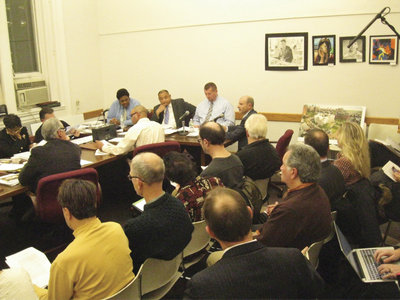A development first proposed as a for-sale condominium project for 272 Grove St. in 2007 is back on the Jersey City Council agenda as a rental development with other changes.
The council introduced an ordinance at its Nov. 26 meeting that would grant 272 Grove St. Urban Renewal LLC approval to switch from a first proposed condominium project to a market rate rental, increasing the number of total units from 88 to 99 but reducing the number of parking spaces to 46. The project would also receive a 25-year tax abatement.
This is a project proposed by Eric and Paul Silverman that has previously turned the nearby historic Majestic Theater into condominiums.
Their company also has a project at former St. Francis Hospital into Hamilton Square. They have completed about 15 projects throughout the city, most of which are rehabs of old buildings.
Called the Majestic II Redevelopment Project, the two-building development located at Montgomery, Grove, and York streets has also expanded its retail space from originally proposed 8,500 to 20,000 square feet. Currently on the block are an empty storefront (formerly a deli and a carpet store), a church that closed recently, and several apartment buildings with empty lots beside them.
“The Planning Board wanted less parking in that area of the city.” – Paul Silverman
____________
Paul Silverman said the development reduced the number of spaces to discourage car traffic in a congested area and noted that his company has parking garages in the area.
“The Planning Board wanted less parking in that area of the city,” Silverman said. “We own six parking garages and they can be redirected there.”
If the price of the parking space goes up, then the city will get more revenue, something that will be determined by an annual audit.
With street level stores and parking, the project already has received approval from the Jersey City Planning Board in 2012, although at least two of the council people elected last June raised questions about details of the project – especially projected revenues the developer expects to get.
The city, in lieu of taxes would see an increasing percentage of the property’s annual rental revenue in five phases over 17 years, starting with 10 percent and ending with 16 percent. This would equate to about 20 percent of the taxes the property would normally generate, but eventually the project would generate about 80 percent, and pay full taxes at the conclusion of the abatement.
The Majestic II Redevelopment Plan was originally approved for a 25-year abatement in March 2007 as a for sale condominium development, but the project never broke ground. Representatives from the company argued successfully to the Planning Board that a change in market conditions made it no longer feasible for the project to be constructed as first proposed.
In April, 2013, the developer filed to amend the original application and basically restate the project that had been stalled because of the collapse in the real estate economy in 2008.
City will get more
The current site generates about $74,659 in annual taxes. Under the new agreement, which some council members think underestimates the rental revenues, the city would receive about $367,689 annually. The developer will also pay about $189,000 in three installments of about $63,000 each to meet its affordable housing obligation.
Boggiano questioned this contribution asked city administrators whether the developer owes the city interest, since the contract stipulated that the developer pay these fees within 24 months of approval. But the first payment wasn’t made until earlier this month. Jeremy Farrell, corporation counsel for the city, said a bill was never sent to Silverman for the affordable housing amount, so it was not paid.
While the contract called for payment within two years, state law said the these fees are paid in installments tied to the progress of the project, first at ground breaking, second at construction of the first unit, and final when first certificate of occupancy is issued.
The project is expected to generate between 200-250 jobs during the construction phase and 50 to 100 permanent jobs once completed.
Al Sullivan may be reached at asullivan@hudsonreporter.com.
